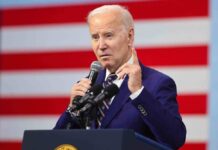
In addition to federal accusations in Florida for unlawfully keeping sensitive materials after leaving office in 2021, Trump is now facing state charges in Georgia and federal charges in Washington for his attempts to reverse his 2020 defeat to Biden. In each case, he has pled not guilty and claimed that the prosecution used political motivation.
Donald Trump may face four separate criminal prosecutions before the US election on November 5. The first of these cases is scheduled for April 15 in Manhattan.
In the prosecution launched against Trump by Manhattan District Attorney Alvin Bragg, 34 allegations of falsifying company documents were listed. Trump has pled not guilty to all of them, as well.
During the final days of Trump’s 2016 presidential campaign, his lawyer and fixer, Michael Cohen, allegedly paid Stormy Daniels $130,000 to keep quiet about a sexual encounter she claimed she had with him at a Tahoe hotel in 2006. Daniels subsequently reportedly falsified records to conceal the incident. Trump insists the porn actress, whose actual name is Stephanie Clifford, and he had no relationship with her and that the money was paid to put an end to her “false and extortionist accusations.”
Even though Trump has already faced three charges related to hush money, the details of this one may seem less severe and tawdry. After an earlier investigation by the US Justice Department, Cohen admitted in 2018 to breaking federal campaign finance laws and testified that Trump had arranged for the payment to Daniels. After concluding that Trump was innocent, federal prosecutors dropped all charges against him in 2019.
The state of New York has a four-year jail term for using false company documents to perpetrate or cover up another crime. If the two federal cases have not yet gone to trial, Trump could halt them if he were to retake the office.
Donations to Trump’s campaign skyrocketed when Bragg was indicted in April 2023, and his lead over other candidates for the Republican presidential nomination in the polls expanded, which he maintained throughout the campaign.













